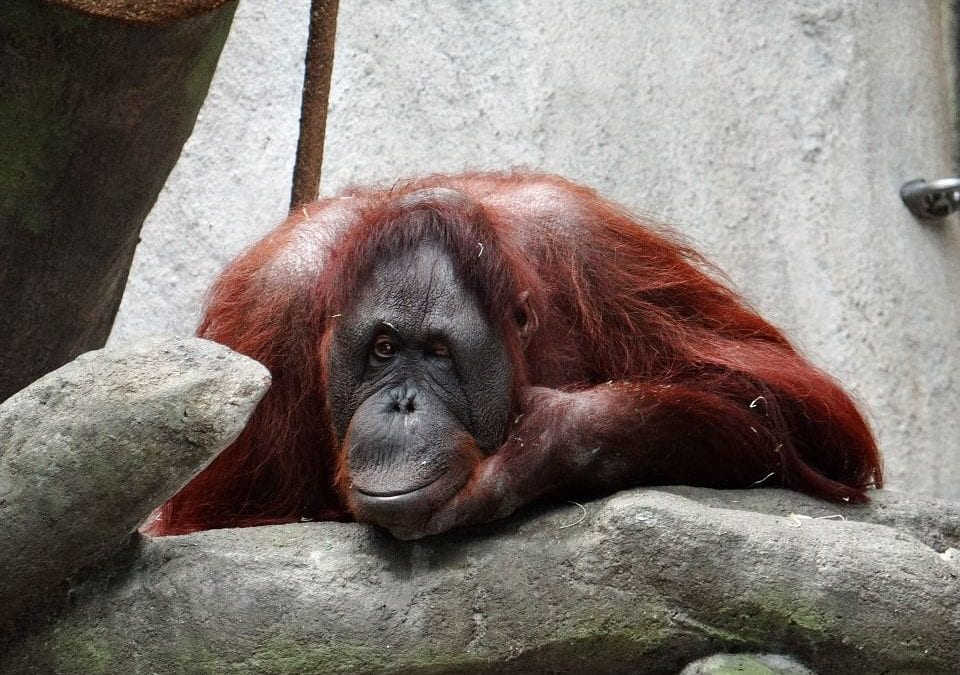By Douglas Sheil, Mike Bruford, Serge Wich, and Stephanie Spehar
New research has shown that Orangutans have been adapting to humans for 70,000 years.
If you are very lucky you might have seen an orangutan in the wild. Most people have only seen them on television. In either case the animal was probably deep in some remote forest, as yet untainted by people. This is the image we associate with these critically endangered animals: vulnerable, dependent on pristine habitats, and incapable of coexisting with people. But that view may be wrong.
Until recently, our ideas about conservation were constrained by romantic notions of “wild” nature and our limited grasp of just how adaptable and robust nature can be. Yet understanding how prolonged exposure to humans has impacted even well-studied species can help overturn assumptions about them and make conservation more effective. The orangutan is a good example.
Orangutans are the largest mammals to primarily live in trees, and they have few predators aside from humans. They generally live at low densities and are unique among apes in being largely solitary. Though orangutan species were once widespread in mainland South-East Asia, the three that remain are restricted to small populations on Sumatra (Pongo abelii and the newly described P. tapanuliensis) and Borneo (Pongo pygmaeus). All orangutans are critically endangered, but it was assumed that significant human impacts mostly took place within the past 60 years, leading to the view of orangutans as “untouched” and lacking the capacity to adapt to humans.
But we may have misjudged the orangutan. That’s the conclusion of research we have just published, together with co-authors, in Science Advances. Rather than being an ecologically-fragile ape, there is evidence that orangutans have long been adapting to humans. The modern orangutan is the product of both environmental and human impacts, and where they live and how they act appear to reflect our shared history.
We are not implying that orangutans aren’t endangered by current human activities – they are. For example, between 1999 and 2015, Borneo’s orangutan population plummeted by about 50%, a loss of an estimated 100,000 individuals in 16 years. The main factor responsible for this was likely hunting. But if major threats like hunting are controlled – an important “if” – then orangutans may be better able to coexist with people than is widely thought. This opens up opportunities for conservation beyond simply protecting remote forests.
Coexistence for 70,000 years
People and orangutans have been in contact ever since modern humans made their home in the wet tropics some 70,000 years ago. At that time orangutans were widespread and abundant. Their teeth are relatively common among animal remains found in China, Vietnam, and Thailand suggesting they were easy pickings for prehistoric hunters.
Orangutans underwent a precipitous decline around 20,000 years ago, resulting in a restricted distribution and low densities even before mass deforestation over the past century. While the climate likely had some effect, evidence from fossils, archaeology and genetics strongly suggests a human role. Specifically, we found that the arrival of humans – and especially advances in their hunting technologies, such as projectile weapons and, later, blowguns and guns – match up with orangutan declines.
Indeed, it appears that ancient humans nearly wiped out the orangutan, as they did the woolly rhino, giant ground sloths, and other Pleistocene megafauna. Surviving orangutans probably modified their behaviour to counter this threat, perhaps retreating further into the thickest forests to avoid human hunters.
That ability to adapt is still present in orangutans, and is also why they are still around today. Recent studies have found they can get by reasonably well in logged forests, and they even inhabit fragmented forest landscapes dominated by oil palm and other crops, although they still need access to natural forest. When their preferred foods (ripe fruit) are not available, orangutans are even able to eat a wide variety of “fallback foods” like bark.
The good news
The realisation that orangutans have already adapted to a world dominated by humans has implications for conservation. The fact that these animals can survive relatively well in plantations and farmland outside pristine forests – as long as they are not being hunted – means that these areas should be integrated into conservation strategies. This is especially important given that most orangutans today do not live in protected forests, but in areas open to human use.
The line between nature and human-dominated world is increasingly blurred. Most species have adapted to human activities in some manner. This isn’t always a good thing, but with the orangutan it allows us to see conservation opportunities that were previously invisible.
This article was originally published on The Conversation and has been republished under a creative commons license. For the original, click here.
Douglas Sheil is a Professor of Environmental Sciences at the Norwegian University of Life Sciences. He is an expert in forest ecology and conservation.
Mike Bruford is a Professor of Organisms and Environment at Cardiff University. He is an expert in molecular ecology.
Serge Wich is a Professor of Primate Biology at Liverpool John Moores University. He is an expert in primate behavioral ecology.
Stephanie Spehar is a Professor of Anthropology at the University of Wisconsin-Oshkosh. She is an expert in wildlife conservation.
Disclaimer: The ideas expressed in this article reflect the author’s views and not necessarily the views of The Big Q.
You might also like:
How have our relationships with animals changed humans? 🔊
How do we apply what we know about ape behaviour and ecology to conservation practice? ▶

